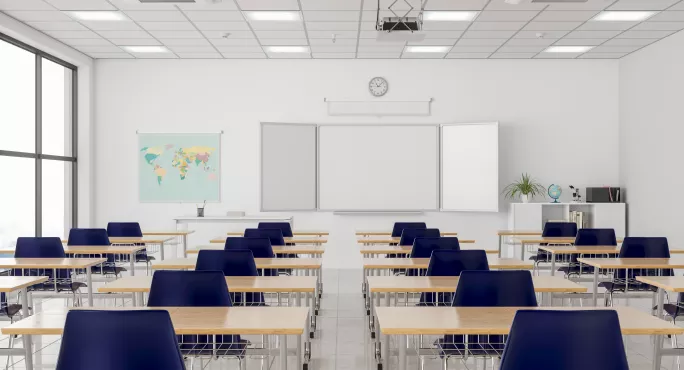GCSEs 2021: Grading will be ‘more generous’ next summer

Students taking GCSE and A-level exams next year will be awarded more generous grades in line with those awarded in 2020 to compensate for disruption to their schooling caused by the pandemic, the education secretary has announced.
Gavin Williamson said students in England will receive advance notice of some topics ahead of tests - as well as exam aids when sitting papers, such as formula sheets or vocabulary lists - to ensure that this cohort of students is not disadvantaged.
Related: 5 things we learned about exams in 2021
GCSEs and A levels 2021: 9 options to counter Covid
Exclusive: Would regional GCSE grades be fair?
However, it is understood that there will be no differential grading based on the regional impacts of the pandemic.
Additional contingency papers will also be run to give students a second chance to sit a paper if the main exams or assessments are missed owing to illness or self-isolation, the Department for Education (DfE) said.
The announcement of new measures comes after the fiasco around grading of GCSE and A-level students in the summer, when exams were cancelled amid the coronavirus pandemic and school closures.
Thousands of A-level students had their results downgraded from school estimates by an algorithm before Ofqual announced a U-turn, allowing them to use centre-assessed grades (CAGs) instead.
In October, the government announced that the 2021 exams would still go ahead in England, but that the majority of them would be delayed by three weeks to give students more time to catch up on learning. But it has come under sustained pressure from heads, teachers and others to take further action to mitigate the impact of learning loss and disruption caused by the pandemic.
Today, Mr Williamson responded by unveiling a package of measures to ensure that the grades students receive are as fair as possible.
Students will be given aids, such as formulae sheets, in some exams to boost their confidence and reduce the amount of information they need to memorise, as part of the measures, as well as vocabulary lists for languages exams.
Open-book exams in English literature will not be introduced, however.
The generosity of 2020 grading levels will be maintained in 2021, but this will be averaged out across subjects, after some subjects such as A-level music saw their grading disproportionately boosted through the use of teacher assessment in 2020.
Different grading levels based on region to account for areas disproportionately impacted by the pandemic has been ruled out, Tes understands, as has the use of “optionality” in question papers.
But a new expert group will be set up to look at differential learning loss and to monitor the variation in the impact of the pandemic on students across the country.
Under new contingency measures, students who miss one or more exams due to self-isolation or sickness, but who have still completed a proportion of their qualification, will still receive a grade.
If a student misses all their assessments in a subject, they will have the opportunity to sit a contingency paper held shortly after the main exam series.
If a student has a legitimate reason to miss all their papers, then a validated teacher-informed assessment can be used but only once all chances to sit an exam have passed.
It comes after DfE figures revealed that more than a fifth (22 per cent) of secondary school students were absent from school last week for the second week running.
Mr Williamson said: “Exams are the best way of giving young people the opportunity to show what they can do, which is why it’s so important they take place next summer.
“But this isn’t business as usual. I know students are facing unprecedented disruption to their learning. That’s why exams will be different next year, taking exceptional steps to ensure they are as fair as possible.
“I am determined to support students, parents and teachers in these unprecedented times and hope measures like more generous grading and advance notice of some topic areas will give young people the clarity and confidence they need to achieve every success.”
The DfE has also announced that full, graded Ofsted inspections will not resume until the summer term and exam results will not be included in school performance tables this year.
Paul Whiteman, general secretary of the NAHT school leaders’ union, said: “In September, we were faced with secondary exams proceeding unaltered, all primary assessments going ahead as normal, full publication of performance data, and a return to inspection in January.
“This announcement brings with it some much-needed relief to school leaders who have been operating in ‘emergency mode’ for most of this year.”
He added: “Whilst the government has not gone as far as we would have liked, they have moved significantly towards the profession. We will continue to work with them on the areas where we still have concerns.”
Geoff Barton, general secretary of the Association of School and College Leaders (ASCL), said: “This solution to next year’s A-level and GCSE exams will make them as fair as they can be in the circumstances.
“It is not perfect - nothing can be given the fact that learning has been so disrupted by coronavirus and that pupils have been affected to vastly different extents.
“But various options have been discussed exhaustively, and, frankly, schools and colleges just need a decision. The uncertainty has gone on for much too long and they need to be able to get on with the job of preparing their pupils for these important exams.”
Register with Tes and you can read two free articles every month plus you'll have access to our range of award-winning newsletters.